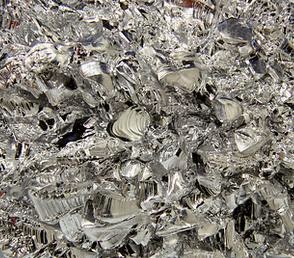1
Our sun could not manufacture magnesium, as its mass is too small. Only stars
with over three times the mass of our sun or supernovae has sufficient heat and
pressure to fuse helium and neon atoms to produce magnesium.
2
Magnesium is the fourth most abundant element of the earth’s mass after iron,
oxygen and silicon. This might explain why magnesium is the third most abundant
element found in seawater.
3
Humphry Davy was the first to extract a small amount of magnesium in its pure
form in 1808 from magnesium oxide via a process of electrolysis (the
administering of an electric current to drive a chemical reaction).
 |
| Magnesium Element |
4
Magnesium Facts
Atomic
number: 12
Atomic
weight: 24.3050
State:
solid
Category: grey-white alkaline earth metal
Melting
point: 650°C (1,202°F)
Boiling
point: 1,090°C (1,994°F)
What is Epsom Salts?
5
Magnesium sulphate, known also as Epsom Salts is named after Epsom Common in
Southern England where in 1618, farmer Henry Wicker noticed a particular pool
remained untouched by his cattle. On evaporating a water sample, extracted
crystals of magnesium sulphate. This alkaline substance has since become a key
ingredient in Milk of Magnesia (magnesium hydroxide), an antacid and laxative.
Health Uses of Magnesium
6
Magnesium has great healing properties and is often used to treat abrasions,
cuts and wounds. Within an emollient or bath oil can help to alleviate rashes
and other skin irritations.
7
Magnesium is the fourth most abundant trace element found in the body, as it is
responsible for over three hundred biochemical processes and activates
countless enzymes. Essential for bone formation, heart health, muscle tone and
blood sugar regulation, magnesium deficiency can lead to muscle cramps,
sleeping disorders, depression, lethargy and facial tics. Without magnesium,
the muscles would be in a constant state of contraction. This can be remedied
by a diet of nuts, soya and beans.
 |
| Magnesium Symbol |
8
Chlorophyll would not exist without magnesium. It is magnesium’s metallic ion
lying at its core that helps drive photosynthesis. Deficiency in this mineral
can be seen when the leaves turn brown or discolored.
Magnesium Fascinating Facts
9
When added as an alloy to aluminum, magnesium creates a lightweight and strong
metal for aircraft, car paneling and missiles. Being three times lighter than
aluminum, magnesium alloy reduces pollution, as less fuel is needed. The metal
can also be recycled.
10
Magnesium is highly flammable when powdered, granulated or shaved into fine
pieces, producing a blinding white light. But when in a solid block is
virtually impossible to ignite.
11 Magnesium is the flammable element used in photographic flashbulbs, flares,
sparklers, fireworks and pyrotechnics.
12
Talcum powder is finely ground magnesium silicate, used in cosmetics and
keeping skin fresh and dry. But talc has many other uses, namely papermaking,
paint manufacture, ceramics, a food additive and for crayons.
No comments:
Post a Comment